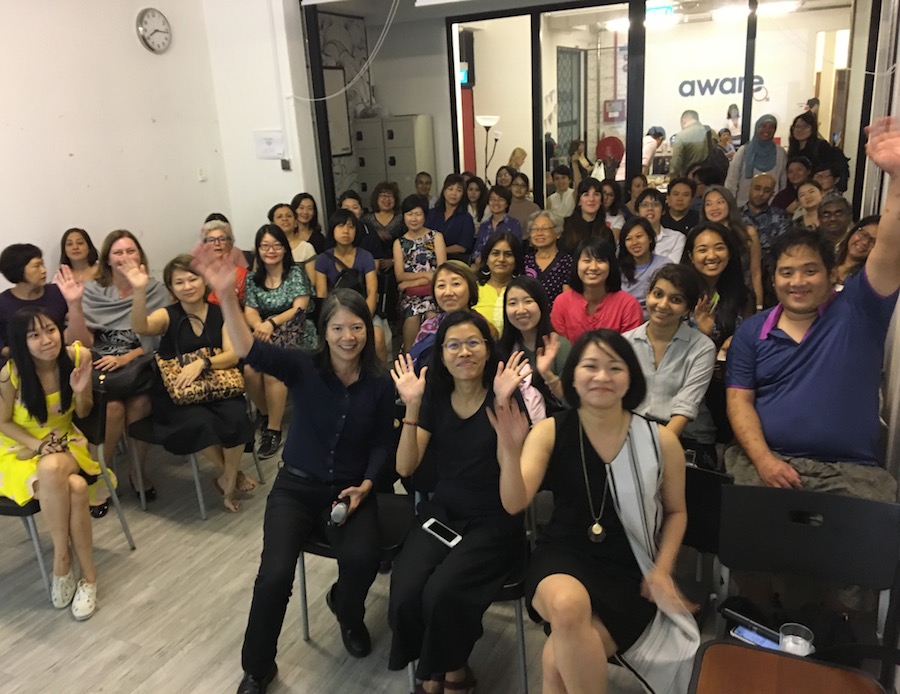-
Advocacy Theme
-
Tags
- Abortion
- Adoption
- Caregiving
- CEDAW
- Disability
- Domestic Violence
- Domestic Workers
- Harassment
- Healthcare
- Housing
- International/Regional Work
- Maintenance
- Media
- Migrant Spouses
- Migrant Workers
- Muslim Law
- National budget
- Parental Leave
- Parenthood
- Polygamy
- Population
- Race and religion
- Sexual Violence
- Sexuality Education
- Single Parents
- Social Support
- Sterilisation
- Women's Charter
A Recap: Financial Literacy and Low-Income Women Talk, by Daughters of Tomorrow and AIDHA
May 6th, 2019 | Events, News, Poverty and Inequality
Written by Megan Tan, AWARE intern
What comes to mind when you hear the word “rich”? Are rich people smart or are they just lucky? What about the word “poor”? Are poor people disadvantaged or resourceful? Can money do wonders, or is it just paper?
These were some of the questions raised by presenter Tan Yingjie at the “Financial Literacy and Low-Income Women” talk at AWARE on 25 April 2019.
Yingjie is Special Projects and Corporate Partnership Manager for Daughters of Tomorrow (DOT), which provides assistance to low-income women through various programmes, such as skill-building. Her co-presenter that night was Jacqueline Loh, CEO of AIDHA, an organisation that provides financial literacy courses to foreign domestic workers living in Singapore. DOT and AIDHA—both recipients of AWARE’s Power Fund in 2018—came together to present their findings after conducting a financial literacy programme, entitled “Managing My Money”, for low-income women. Mentors from AIDHA led the 10 sessions in the programme.
Of the 13 participants who began “Managing My Money”, nine successfully graduated. Who were these participants, and why was it so important for them to learn financial literacy?
Because of their poverty, “some of the benefactors we serve actually struggle to get out of the house,” Yingjie told the audience. These women are forced to choose between spending their meagre savings on public transportation, or putting food on the table for the day. Simple best practices, therefore, were crucial lessons for these women, so that they could grow their savings and enable their money to serve them better.
After Yingjie kicked the talk off with the word association exercise mentioned above, she then tallied the audience’s sentiments. The overall results: General attitudes towards money were neutral, while attitudes towards the word “rich” were more positive, and those towards “poor” tended negative.
Those results were “kind of funny”, Yingjie remarked, because during the programme, participants had given opposite responses—displaying negative attitudes towards the word “rich” and the concept of money. This basic attitudinal tracking might seem inconsequential, but it was important, said Yingjie—after all, having more positive feelings about money generally encourages someone to keep track of their savings better.
One big takeaway from the programme, the presenters shared, was that participants benefited from a safe space to discuss their financial struggles. Additionally, they were able to hold each other accountable to their savings plans, created during the sessions. For instance, if one woman found she spent excessively on bubble tea, the other attendees would check in with her at the next session to make sure she had made progress in saving that expenditure.
Participants also exchanged saving tips with each other. One such tip was switching off the mains when leaving the house, to help lower utility fees.
To evaluate the programme’s effectiveness, DOT and AIDHA surveyed the participants before and after the programme. Yingjie and Jacqueline were pleased to announce that participants’ overall average monthly savings increased after the sessions. Prior to the programme, the figure stood at $68. After the programme, it had climbed to $156. “I can say pretty confidently that we reached our goals,” said Jacqueline.
Both presenters shared their plans for future iterations of the programme. There is always room for improvement—for example, making programme assignments more engaging, increasing enrolment and preventing future dropouts. Another proposed tweak was sharing more information with the programme’s mentors on each participant’s individual financial situation, to allow mentors to better advise the benefactors.
Overall, DOT and AIDHA deemed the programme to be successful at empowering low-income women. “It was really wonderful to see them at graduation,” said Jacqueline.
DOT and AIDHA will be conducting another run of the “Managing My Money” course. If you are keen to take part, or have beneficiaries to refer, please visit the Daughters of Tomorrow and AIDHA websites.




